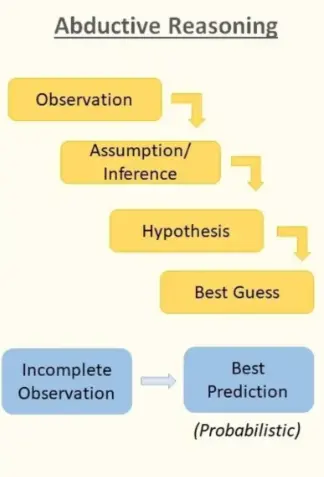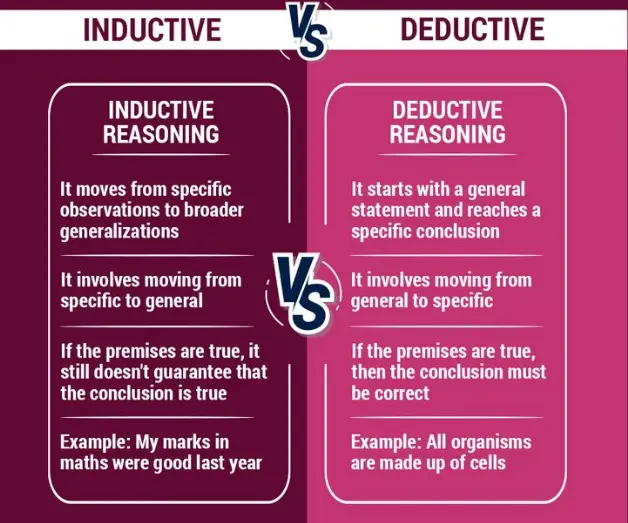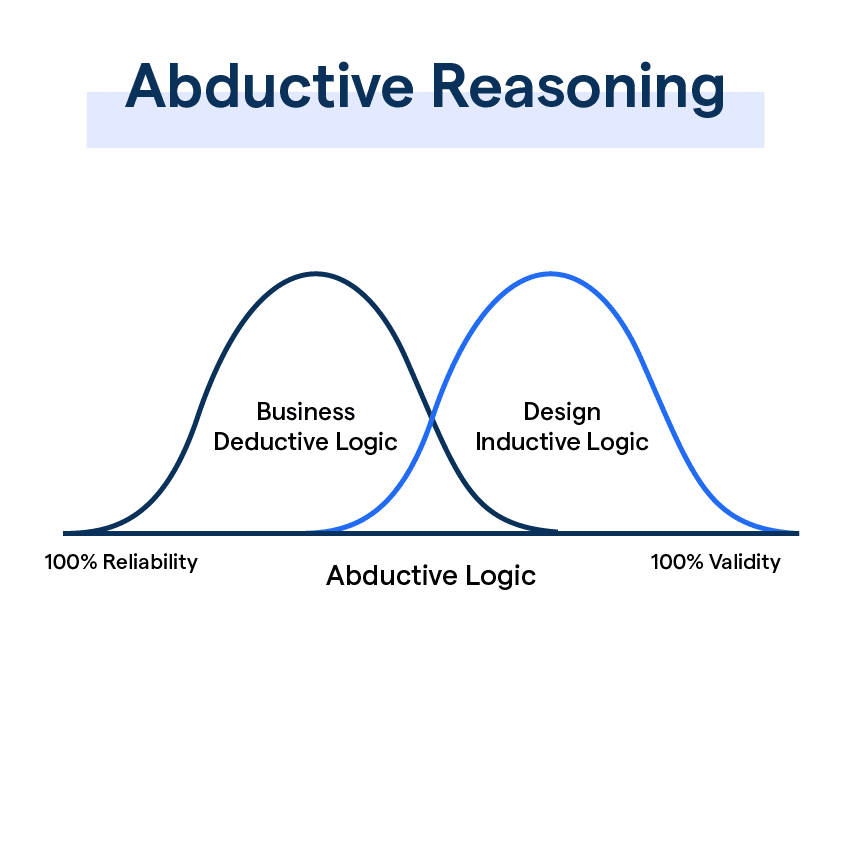Introduction
Reasoning is the cognitive process through which individuals draw conclusions, make inferences, or develop beliefs based on available evidence. It is a fundamental aspect of human cognition, allowing for problem-solving and decision-making.
The three primary types of reasoning are deductive reasoning, inductive reasoning, and abductive reasoning. This glossary provides definitions and explanations of key concepts associated with these reasoning types, focusing on their characteristics, differences, and applications.
What is Deductive Reasoning?
Deductive reasoning, often referred to as "top-down" logic, is a method of reasoning from the general to the specific. It begins with a general statement or hypothesis and examines the possibilities to reach a specific, logical conclusion.

Key Features of Deductive Reasoning
The key features of deductive reasoning are the following:
- Certainty: Deductive reasoning leads to conclusions that are certain, provided the premises are true.
- Structure: Deductive reasoning typically follows a structured format, often expressed in syllogisms (e.g., if A is true and B is true, then C must be true).
- Example: The examples of deductive reasoning is as follows:
- Premise 1: All humans are mortal.
- Premise 2: Socrates is a human.
- Conclusion: Therefore, Socrates is mortal.
Deductive Thinking
Deductive thinking refers to the cognitive process of deducing specific implications from general principles. Deductive thinking is essential in mathematics and formal logic, where rules and definitions are strictly applied.
Application of Deductive Reasoning
Deductive reasoning is commonly used in scientific research, law, and mathematics, where established laws or rules are applied to specific cases.
What is Inductive Reasoning?
Inductive reasoning, also known as "bottom-up" reasoning, involves drawing general conclusions from specific observations or evidence. It does not guarantee certainty but provides probable conclusions based on the evidence at hand.

Key Features of Inductive Reasoning
The key features of inductive reasoning are the following:
- Probabilistic Nature: Conclusions reached through inductive reasoning are probable but not guaranteed.
- Flexibility: Inductive reasoning allows for the formulation of generalizations that can be adjusted as new evidence is introduced.
- Example:
- Observation: The sun has risen in the east every day so far.
- Conclusion: Therefore, the sun will rise in the east tomorrow.
Inductive Statement
Inductive statement is a statement that reflects a conclusion drawn from specific instances. For example, "All observed swans are white" is an inductive statement based on the observation of multiple swans.
Inductive Conclusion
An inductive conclusion is a conclusion that arises from an inductive argument, suggesting a generalization based on limited observations.
Reasoning Inductive
Reasoning inductive refers to the cognitive process of forming generalizations from specific instances. Reasoning inductive plays a crucial role in scientific investigations where hypotheses are formulated based on observed data.
Application of Inductive Reasoning
Inductive reasoning is widely used in scientific research, where patterns are identified through observation and experiments. Inductive reasoning leads to hypotheses and theories.
Suggested Reading:
Logical Deduction: Procedure, Types and Applications
What is Abductive Reasoning?
Abductive reasoning, often described as "inference to the best explanation," is a form of reasoning that starts with an incomplete set of observations and proceeds to the likeliest possible explanation for the observations.

Key Features of Abductive Reasoning
The key features of abductive reasoning are the following:
- Incompleteness: Abductive reasoning is used when information is incomplete, and the goal is to find the most plausible explanation.
- Pragmatic: It is often applied in everyday problem-solving and decision-making.
- Example:
- Observation: The grass is wet.
- Conclusion: It probably rained (though there could be other explanations, such as someone watering the lawn).
Applications of Abductive Reasoning
Abductive reasoning is commonly used in diagnostic processes, such as medicine and troubleshooting, where practitioners must make educated guesses based on the available evidence.
Induction vs Deduction Reasoning
Induction vs deduction reasoning are key methods in logical thinking, each offering distinct approaches to forming conclusions. Here’s a breakdown of inductive vs deductive thinking and their applications.
Differences in Directions
This point explores the foundational distinctions between induction vs deduction reasoning, focusing on their approaches and outcomes.
Direction of Reasoning
Deductive reasoning moves from general premises to specific conclusions. Meanwhile inductive reasoning goes from specific observations to general conclusions.
Certainty vs. Probability
Deductive reasoning provides certain conclusions given true premises. Whereas inductive reasoning offers probable conclusions based on evidence.

Examples in Context
Here, we examine real-world instances of induction vs deduction reasoning in action across various fields.
Deductive Reasoning in Law
Legal professionals use deductive reasoning to apply laws to specific cases. For example, if the law states that theft is illegal and a defendant is proven to have taken someone’s property without permission, the conclusion that the defendant committed theft is deductive.
Inductive Reasoning in Marketing
Marketers often use inductive reasoning to draw conclusions about consumer behavior. If data shows that most customers who purchase product A also buy product B, they might conclude that product A encourages the purchase of product B.
Practical Applications
Discover how induction vs deduction reasoning are applied in everyday life, from scientific research to daily decision-making.
Deductive Reasoning
The practical applications of deductive reasoning are the following:
- Scientific Research: Researchers often use deductive reasoning to test hypotheses derived from established theories. For example, if a theory predicts a specific outcome, researchers can conduct experiments to confirm or refute the theory.
- Everyday Decision-Making: When making decisions based on established facts or rules, individuals often employ deductive reasoning. For example, knowing that all vehicles must stop at red lights leads to the conclusion that a specific car will stop at the red light.
Suggested Reading:
Analogical Reasoning
Inductive Reasoning
The practical applications of inductive reasoning are the following:
- Scientific Research: Scientists utilize inductive reasoning to develop theories based on observed phenomena. For instance, repeated observations may lead to the formulation of a new theory about a natural occurrence.
- Everyday Decision-Making: Individuals frequently rely on inductive reasoning in everyday situations. For example, if a person notices that their friends who eat healthy tend to be more energetic, they might conclude that eating healthy contributes to higher energy levels.
Limitations
Here, we review the inherent limitations of induction vs deduction reasoning, exploring where each method may fall short.
Deductive Reasoning
The practical limitations of deductive reasoning are the following:
- Dependence on Premises: The validity of deductive reasoning heavily depends on the premises' truth. If the premises are false, the conclusion may also be false.
- Limited Scope: Deductive reasoning does not account for new or unobserved phenomena; it only applies to what is already known.
Inductive Reasoning
The practical limitations of inductive reasoning are the following:
- Lack of Certainty: Inductive reasoning does not guarantee that the conclusion is true. Future observations could contradict the inductive conclusion.
- Overgeneralization: There is a risk of overgeneralizing from a limited number of observations, leading to inaccurate conclusions.
Inductive vs Deductive Thinking
Inductive vs deductive thinking are two primary reasoning approaches in logic. When comparing inductive vs deductive thinking, the former is explorative and open to various possibilities, making it ideal for hypothesis formation.
Deductive thinking, however, is definitive, allowing for reliable conclusions given valid premises.
Inductive vs deductive hypothesis approaches highlight these differences: inductive hypotheses are formed through patterns and observations, while deductive hypotheses are tested through logical application of general rules.
Both reasoning styles are essential, balancing innovation and rigor across scientific, mathematical, and philosophical contexts.
Inductive vs Deductive Hypothesis
In research, inductive vs deductive hypothesis approaches represent two primary methods of reasoning.
Inductive reasoning starts with specific observations, using inductive evidence to formulate general theories, creating an inductive statement that leads to an inductive conclusion. This inductive thinking approach moves from specific cases to broader generalizations.
In contrast, deductive reasoning begins with a general theory or premise, using deductive thinking to apply it to specific cases, leading to a tested hypothesis and specific conclusions. Induction vs deduction reasoning differs mainly in direction—inductive moves from specific to general, while deductive goes from general to specific. Both offer valuable insights in research.


